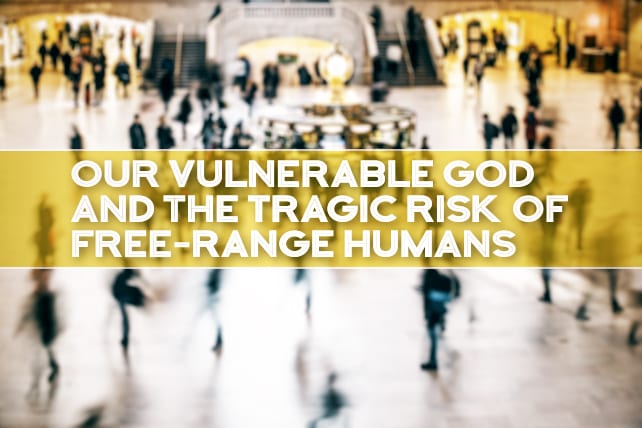Did God intentionally choose to make himself vulnerable in order to have a creation that could love and serve him? This is the discussion I started in my last post: Worshiping a Great Big Vulnerable God.
One tweet I received in response basically said, “Lovers are vulnerable. If God is infinitely love, then he is infinitely vulnerable.” There is truth to this. In the sense that God’s love for us makes him vulnerable because it causes him pain when we make decisions that hurt ourselves and others, I don’t think most Christians would disagree. But I intend to push the envelope a little farther than asking whether God’s love makes simply him emotionally vulnerable.
The real questions is: Did God intentionally order the universe in a way that wove risk into its fabric? Many will immediately say, “NO! This diminishes his sovereignty.” But I think that’s only the case if God didn’t choose to make such a world.
God’s ecosystem and free-range humans
The creation story puts Adam and Eve into a carefully created environment. And although they are given dominion over everything in the garden, they are still part of this intricate ecosystem. Their “dominion” or power over creation is a gift and display of trust (and vulnerability) on God’s part. In order to empower humans the way he intended, he put an entire creation that he has called “good” at risk.
I think we need to understand creation as a complex ecosystem where human (and on some level angelic) decisions have an outcome larger than the immediate consequences to them personally. It isn’t until we really appreciate how delicately woven together creation is that we can understand the peril involved. Obviously we know that Adam and Eve’s decision to eat of the forbidden fruit cast everything into chaos. It wasn’t an act of disobedience that resulted in punishment for them alone; it was an act of rebellion that affected everything, and would lead God to despair that he had ever created mankind.
“The Lord saw that the wickedness of humankind was great in the earth, and that every inclination of the thoughts of their hearts was only evil continually. And the Lord was sorry that he had made humankind on the earth, and it grieved him to his heart.” (Gen. 6:5–6)
Give us a king!
In the eighth chapter of 1 Samuel, Israel comes to the prophet Samuel demanding a king like all the other nations. Currently operating as a theocracy, Samuel serves as an intermediary between the Lord and Israel. Samuel immediately takes their request as a personal rejection, but God sees it for what it is—a rejection of him. In one of Scripture’s saddest passages, God tells Samuel:
Listen to the voice of the people in all that they say to you; for they have not rejected you, but they have rejected me from being king over them. Just as they have done to me, from the day I brought them up out of Egypt to this day, forsaking me and serving other gods, so also they are doing to you. Now then, listen to their voice; only—you shall solemnly warn them, and show them the ways of the king who shall reign over them. —1 Samuel 8:8–9
So Samuel warns them of the consequences of this choice:
“These will be the ways of the king who will reign over you: he will take your sons and appoint them to his chariots and to be his horsemen, and to run before his chariots; and he will appoint for himself commanders of thousands and commanders of fifties, and some to plow his ground and to reap his harvest, and to make his implements of war and the equipment of his chariots.
He will take your daughters to be perfumers and cooks and bakers. He will take the best of your fields and vineyards and olive orchards and give them to his courtiers. He will take one-tenth of your grain and of your vineyards and give it to his officers and his courtiers. He will take your male and female slaves, and the best of your cattle and donkeys, and put them to his work. He will take one-tenth of your flocks, and you shall be his slaves. And in that day you will cry out because of your king, whom you have chosen for yourselves; but the Lord will not answer you in that day.”












